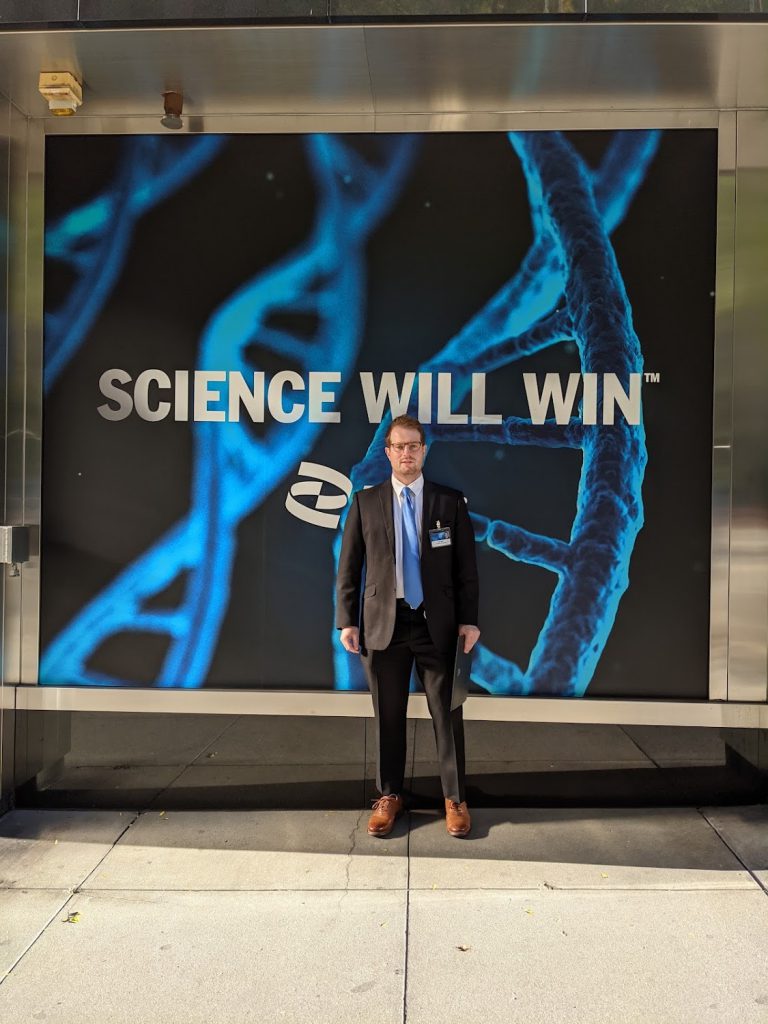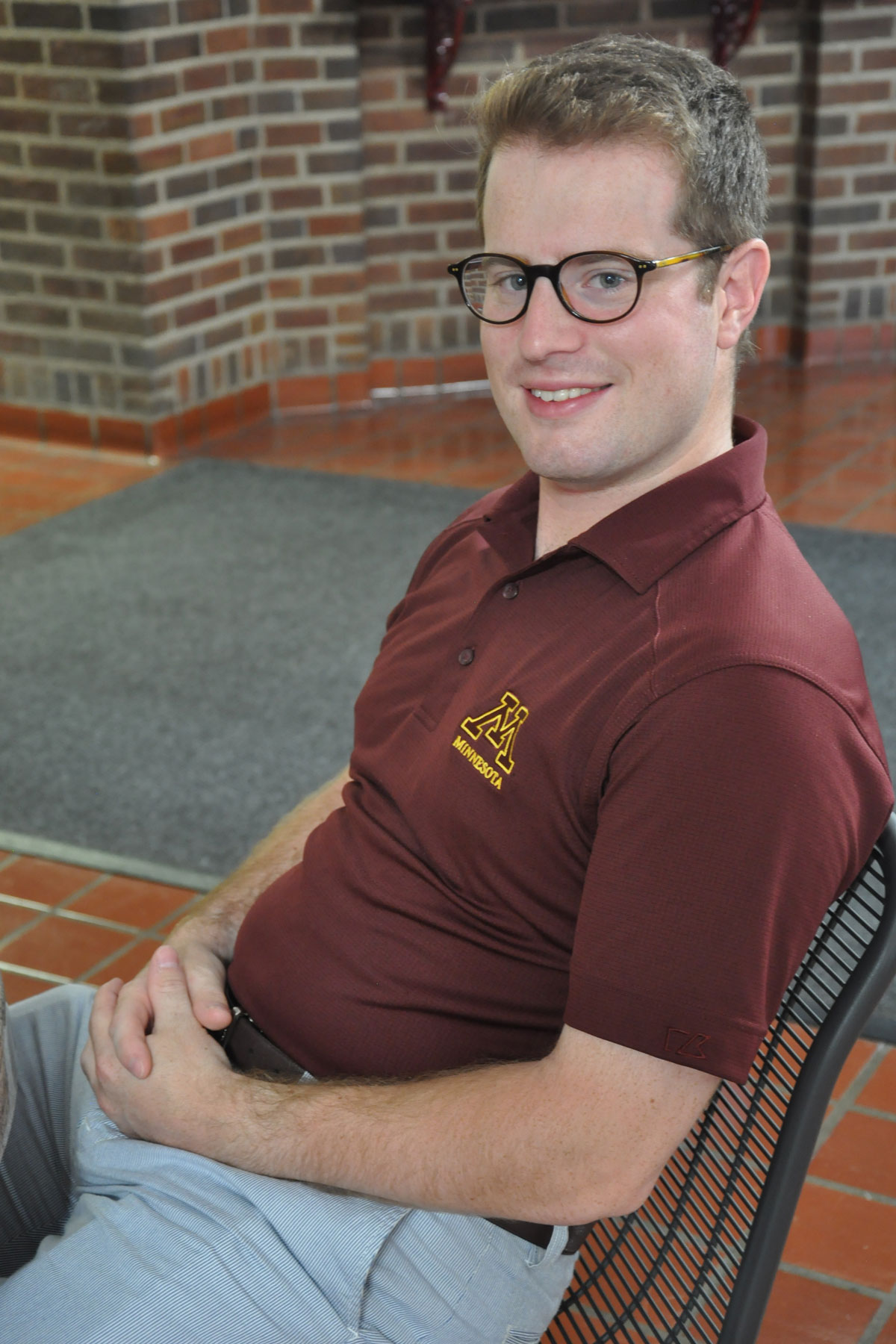Ian West graduated from the School of Kinesiology in 2018 with an MEd in Physical Activity and Health. Read below to learn more about Ian’s journey and where he is now.
Tell us a little bit about yourself.
My name is Ian West and I am originally from Inver Grove Heights, Minnesota. I graduated with an undergraduate degree in psychology and neuroscience in 2017. The year after that, I went on and got my Master’s degree through the School of Kinesiology. I then went to Boston, Massachusetts and worked at Tufts Medical Center, doing research in pain management and neurological processes, along with psychological disorders and pain. Then I returned to Rochester, Minnesota in 2019 to work at Mayo Clinic in the department of psychiatry and psychology. I’ve been there ever since, working on various research projects, including community engagement and how social media can be a platform to help people battling health misinformation. I’m also analyzing how telehealth can benefit patients who do not have access to healthcare. I’m currently working on my PhD in nursing practice in psychiatric mental health at Columbia University.
What made you choose the PAH M.Ed. program here?
During my junior year at the University of Minnesota, I took a couple courses in Kinesiology. Lo and behold, I really enjoyed the material and the concept of physical activity and how that can play such a huge role in psychological illness. From there, I got the opportunity to work on a PhD dissertation with one of the PhD candidates, Morgan Betker. She specifically was looking at cardiac variability in police officers and it was a really cool opportunity to get immersed in kinesiology and physical activity. We worked on heart rate variability testing, vo2 max testing, and underwater weighing.
“The [physical activity and health MEd] program was super diverse. It’s housed in the School of Kinesiology but it expands so much more than that, because kinesiology encompasses so many different disciplines.”
After I graduated, I was undecided about where my career was going. I figured I had this background in research and I wanted to keep building on that, so I attended an open house session for the School of Kinesiology’s physical activity and health MEd program. I knew it was going to give me all of these tools that I didn’t really have a full grasp on yet, like learning better research techniques and methodology, but also learning more about how physiology relates to disease. That is what really pushed me to attend the program.
Was there anything that stood out to you the most from your experience in the program?
The program was super diverse. It’s housed in the School of Kinesiology but it expands so much more than that, because kinesiology encompasses so many different disciplines. What I like about the Kinesiology department specifically is that, because of its broad depth, I was taking courses in multiple disciplines. I took courses in genetics, biochemistry, as well as courses looking at exercise physiology. That really helps you broaden your scope and gives you this well versed knowledge that you might not have in a different department. On top of that, the professors, staff members, and PhD students are all so diverse and have such different backgrounds.
When I was working on my Master’s thesis, I wasn’t sure how to start compiling the data. Talking to people that came from so many different backgrounds really helped. A lot of the Master’s and PhD students didn’t start in a kinesiology background but they came here because they were interested in how physical activity, movement, or exercise science can relate to the problem that they are trying to solve.
“It’s one thing to understand the body’s response to an exercise but it’s another thing to actually get people to do it. Learning those techniques is something you can’t always learn from a textbook or a lecture.”
It was really interesting to learn from someone like Dr. Li Li Ji, who has a background in biochemistry, Dr. Zan Gao, who does a lot in epidemiology, as well as professors that work with community engagement. Because that is a huge part of it. It’s one thing to understand the body’s response to an exercise but it’s another thing to actually get people to do it. Learning those techniques is something you can’t always learn from a textbook or a lecture. Being able to work with faculty, especially with faculty that are so diverse, is just so helpful and the knowledge they have is bountiful beyond belief.
Is there a certain aspect of this industry that really excites you going forward?
Physical activity and exercise is very diverse and encompasses so many different domains. I think we have seen over the last couple of years how people have started to get in more in touch with staying physically active and understanding all of the health benefits that come with living a physically active lifestyle. So I am really interested in tech. I think tech is going to be a huge area in this field going forward and help the field take off to even higher levels than it’s already at.
I think people are fascinated with being able to track their fitness and physical activity, and being able to incorporate that into their health record. Unfortunately with the pandemic, we saw a lot of inactivity and people were becoming more sedentary due to the nature of lockdowns and not being able to go to work and have their same lifestyle. So because of that I think we’re going to have to find creative ways to get people to become more physically active again and I think tech is going to play a huge role in that.
“If you’re interested in something, someone at the University is doing something around that topic. You just have to find them…Most of the time they will be happy to help you or meet with you. Don’t be scared to send those emails because it makes such a difference.”
Do you have any advice for future students?
My best advice would be to get involved. If you’re interested in something, someone at the University is doing something around that topic. You just have to find them. Once you establish that direct communication, it’s going to allow you to thrive because with everything that you are learning in your coursework and research, you’re going to be able to take that information and start applying it. You want to get the knowledge but you really want to be able to apply that knowledge. So I’d really recommend that. Most of the time they will be happy to help you or meet with you. Don’t be scared to send those emails because it makes such a difference.
Any parting thoughts?
Like I said, the U of M is such a good place to go to school because there are so many great professors and without them, the knowledge is not the same. It’s really the professor. Anyone can order the book on Amazon, but the professor is what makes the subject come to life in my opinion. These world-class experts have devoted their career to this knowledge essentially, taking their time to help foster you and teach you in the best way possible. That’s where I would say thanks to them, because without them, the material wouldn’t have been the same and the experience definitely wouldn’t have been the same.
“These world-class experts have devoted their career to this knowledge essentially, taking their time to help foster you and teach you in the best way possible.”





